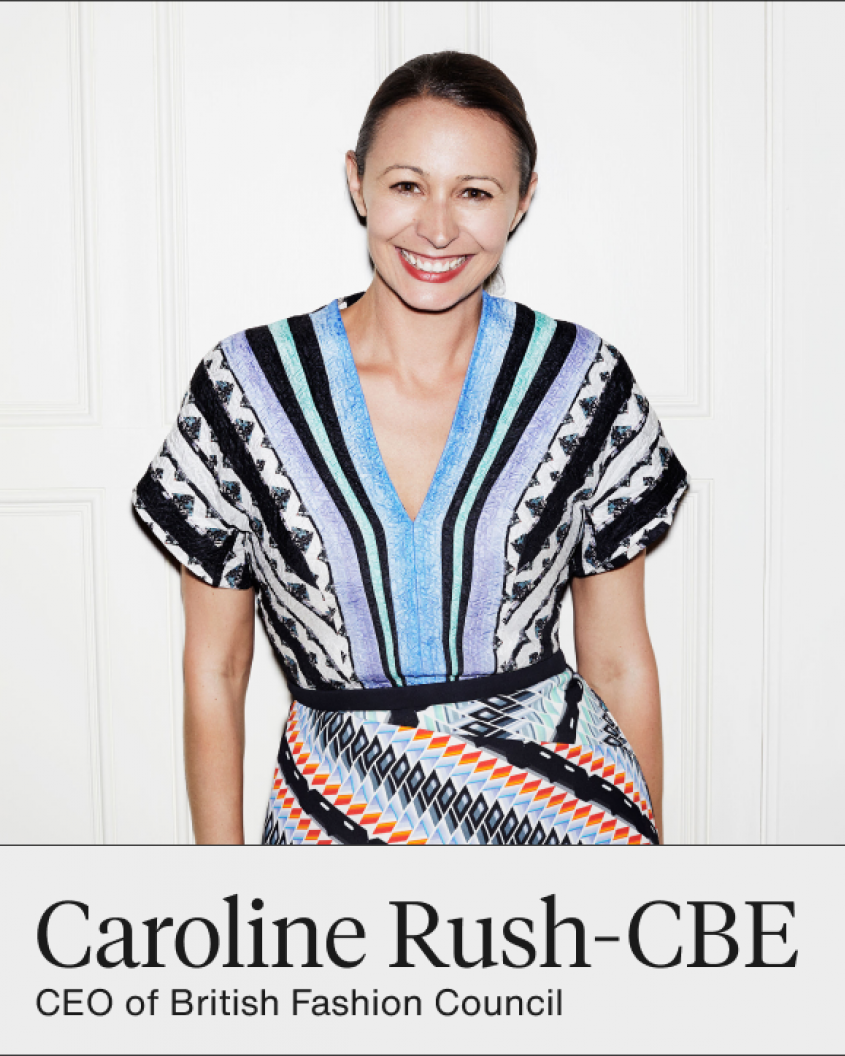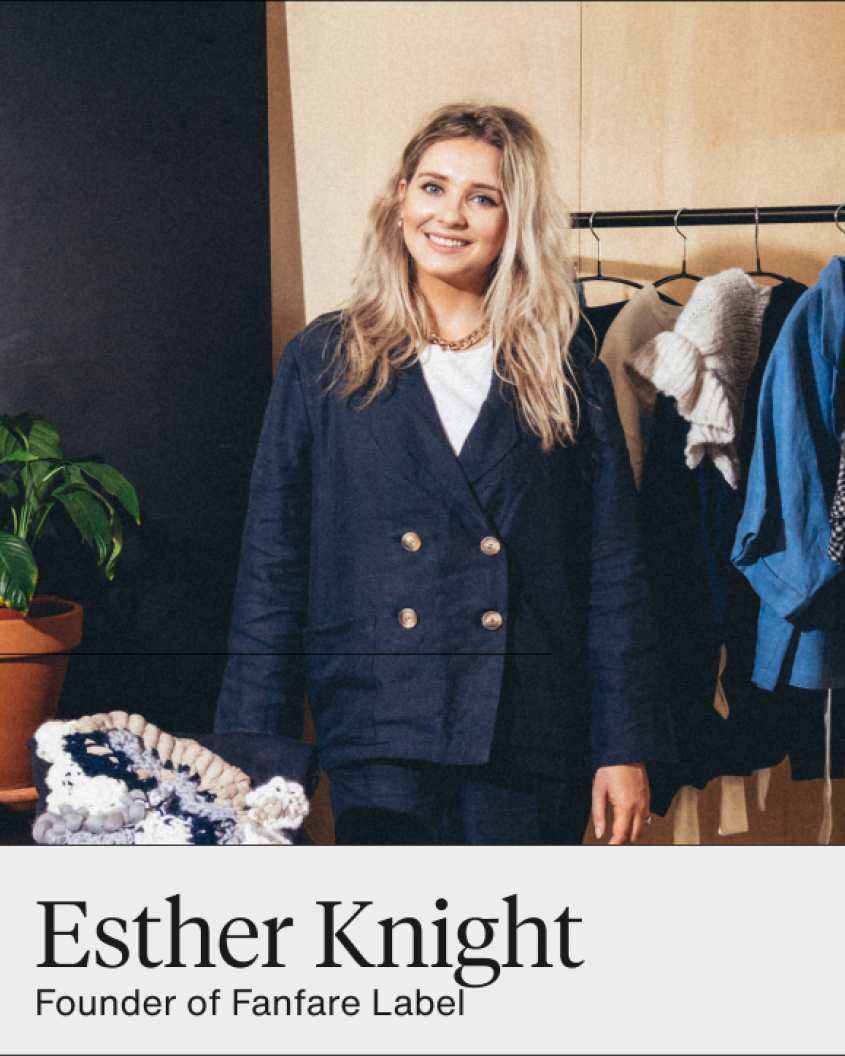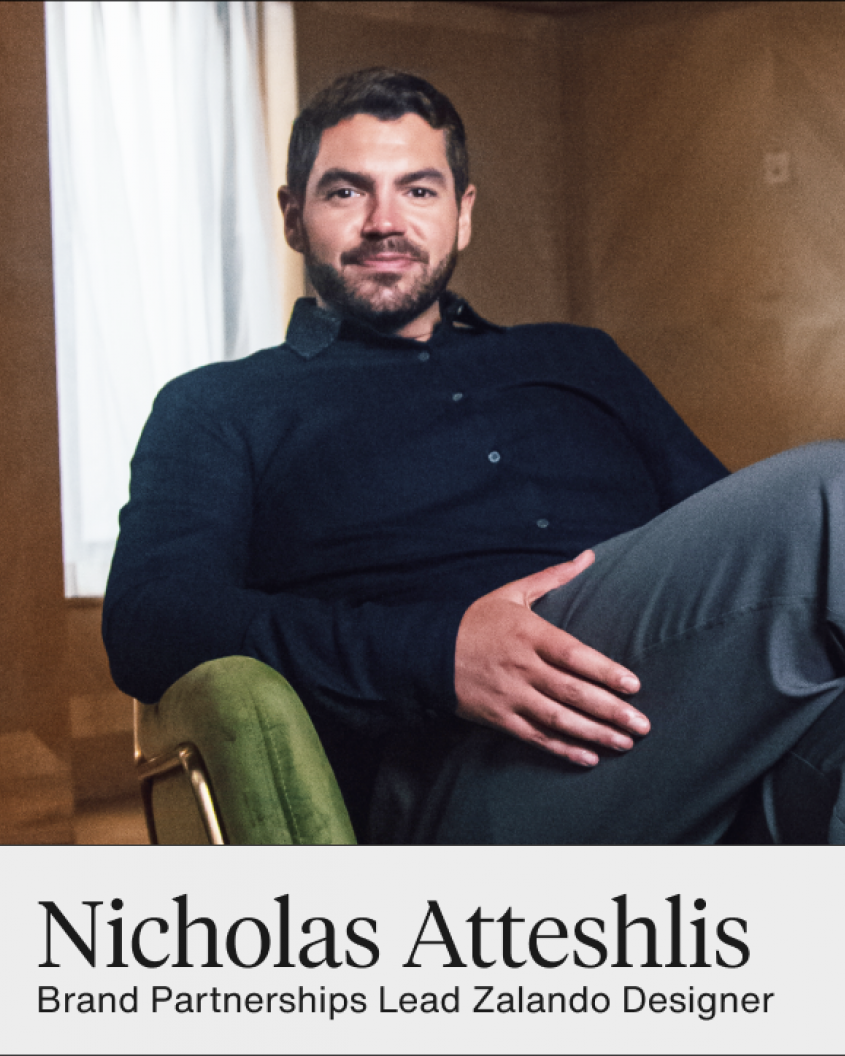"For young talent, mentoring is invaluable."
"For young talent, mentoring is invaluable."
Caroline Rush, CEO of the British Fashion Council (BFC), Nicholas Atteshils, Brand Partnerships Lead for Designer on Zalando and Esther Knight, Founder of Fanfare Label, talk about the importance of support within the industry through the BFC's patronage program.
Caroline Rush, CEO of the British Fashion Council (BFC), Nicholas Atteshils, Brand Partnerships Lead for Designer on Zalando and Esther Knight, Founder of Fanfare Label, talk about the importance of support within the industry through the BFC's patronage program.

Business mentorship is becoming more and more important in the fashion industry – for start-ups and established businesses alike. To have an expert help navigate the industry can be crucial for success and growth. The British Fashion Council’s (BFC) Foundation patronage programme serves precisely that purpose. It was created at the end of 2020 when mentorship was more critical than ever as the industry approached uncertain times. The programme’s mission is to support talented designers at all stages of their business and ensure the fashion industry remains open to everyone.
Caroline Rush CBE, Chief Executive of the BFC and one of the most influential people in the industry, talked to us about the importance of mentorship, what she learned from her own mentor and shared insights into how the BFC helps a new generation of designers. We also spoke with Nicholas Atteshlis, our Brand Partnerships Lead for Zalando Designer. Over the past year, he has been an active patron of the programme, working with up-and-coming designers. One of them is Esther Knight, Founder of Fanfare Label, who also shared her perspective and biggest learnings from the patronage programme.
Caroline Rush
Why did the BFC come up with the mentoring programme? What are the most requested areas of support within the new generation of creatives?
Emerging talent is the future and a reminder of just how creative this industry can be. For young talent starting their careers, mentoring is invaluable. Through the BFC Foundation, we continue to focus on supporting our designers through mentoring programmes to help them build their networks and expertise, which often feeds the global fashion industry. Fundraising and diversifying revenue remain top of the agenda. Grant giving is undeniably important to young designers, especially during the economically challenging times we are in. In the financial year 2021/2022, the BFC remitted over £1.3m in funds to designers and scholars. The BFC Foundation paid £932,500 as part of the BFC’s grant-giving initiatives, including scholarships and talent support schemes.
How do you see the industry taking in newcomers, and how are they guided through the ups and downs?
The BFC Foundation offers BA and MA scholarships to students, as well as links with industry through design competitions, workshops, masterclasses, and networking events. Industry newcomers are also supported through our many talent support initiatives, which offer designers financial support, showcasing opportunities, and mentoring to develop critical skills to future-proof their businesses.
What kind of values, ideas and skills do you see this generation bringing to the industry?
At the moment, I’m particularly impressed by how this generation is putting sustainability and digital at the heart of their business. It’s something that we have talked about as an industry for the past few years, but this generation of designers live and breathe it. They have also proactively taken steps to learn about building a business, not just about designing clothes, and therefore, are building impressive companies that have longevity.
What is your advice to ambitious talents in the fashion industry who want to drive positive change?
The incredible talent and ambition of our young designers is what drives industry-wide change and ignites cultural sparks. My advice to young talents would be to get involved as much as possible, and to explore all possible avenues at the intersection of multiple disciplines. It is crucial to embrace the digital format, in line with making fashion more transparent and accessible to all. Emerging designers building new businesses also need to understand the importance of focusing on smaller collections and core products, preventing textile waste, and creating authentic moments through quality products.
Biography:
Caroline Rush is the Chief Executive of the British Fashion Council. Although she initially pursued an art course, Rush began her public relations and marketing career in the early 90s after being hired by Annette Worsley-Taylor Associates where her long-term collaboration with the British Fashion Council started. She then moved on to manage her own PR company for five years which oversaw the council’s press office for all initiatives before officially joining the British Fashion Council in 2009 as Chief Executive. Since her appointment, Rush has been strengthening its network and platforms to connect businesses with global audiences, both trade and consumer.

Esther Knight
What challenges are young creatives facing when starting out, and where do you think support is needed the most?
I would say the funding of projects is one of the biggest challenges. Running a product-based business is extremely expensive and takes a lot of resources. Knowledge, schemes, opportunities, and initiatives available to individuals and businesses are vital to get most people started.
Why did you join the BFC patronage?
I joined the programme to be mentored and get support in growing my small sustainable start-up. Most of the support I received was general business advice, but I also got advice from industry leaders on how to thrive in the competitive, ever-evolving fashion industry. The BFC has provided me with valuable connections, experience, and knowledge across various sectors, which allowed my brand to grow. It also enabled me to network with like-minded designers. Setting up a business can be very intimidating but also lonely. I went from a fast-paced environment to working independently, and being part of a bigger network has brought stability, support, and business connections.
What is your biggest learning from the BFC patronage experience as a mentee?
This programme has given me guidance in areas that are not within my expertise and I learnt how to set up my business for future growth. Having a different business model with seasonless collections made wholesale difficult to navigate but receiving mentorship in that particular area helped me establish a critical strategy that has benefitted my business significantly.
What is your advice for ambitious fashion aspirants who want to drive positive change in the fashion Industry?
Speak to as many other designers and business owners as possible. Getting advice and guidance from people who have already done it is invaluable. A mentor is key in the early days to keep creatives on track and headed in the right direction. The industry is extremely complex, and it is often hard to know where you fit in, but that support will keep you focused. Don’t go on the journey alone!
Biography:
Previously a buyer for many high street and designer brands, Esther Knight launched Fanfare Label in 2018 after seeing a need for more sustainable fashion practices. The denim brand is known for its unique and contemporary pieces made from textile waste and recycled materials, designed to create a wardrobe that's made to last. Recently, Knight joined the British Fashion Council’s Patronage programme looking for mentorship to further grow her sustainable business in today’s competitive environment.

Nicholas Atteshlis
How do you see the industry taking in newcomers?
Fashion, particularly luxury fashion, all starts with creatives and creativity. You can have the best back end, marketing, and general setup, but the rest is pointless without the correct product's key fundamentals. It's important that new talent be given as much help as possible to flourish and understand the fashion market. Generally, when I meet new designers such as Esther from Fanfare, they are born creatives who always have innovative ideas but need support with market knowledge and commercial success.
What are the most requested areas of support that you’ve been discussing with your mentees? Is there a guiding principle that you apply when mentoring?
Every designer is different and has a different approach to the industry. Some want to focus on DTC, and others want to take the classic wholesale route. However, one common theme, an unfortunate consequence of Brexit, is how to trade with Europe. In particular, logistics and duty can cause havoc on margins, especially for a small brand that manufactures small quantities and needs to stay competitive with pricing.
What kind of values and skills do you see the next generation bringing to the industry?
Growing up in the digital age gives an entirely different perspective on communication style and product to most of today's designers. Previous generations had a very clear line of communication, print magazines, physical stores, and fashion shows. Now the way to reach consumers is so instant, it means that brands need to have a much clearer story and DNA in order to compete in the market and achieve visibility.
What is your advice for ambitious fashion aspirants who want to drive positive change in the (luxury) Fashion Industry?
Know your audience, have a point of view, and be authentic. Don't be afraid to trailblaze, even if you fall down sometimes. You only need one success to create a splash. Try to find a business partner with complementary skills. You can't do everything yourself. Also, remember the power of networking and relationships. We all spend too much time behind our screens. A physical conversation and connections are imperative when you are starting out.
Biography:
As Brand Partnerships Lead Zalando Designer, Nicholas Atteshlis is responsible for establishing and nurturing connections within the luxury fashion industry. A London College of Fashion graduate, Atteshlis started his career in buying at Question-Air, one of London’s leading independent concept stores for ten years before assuming his current role at Zalando. Most recently, he joined the British Fashion Council as a mentor to support up and coming designers.



